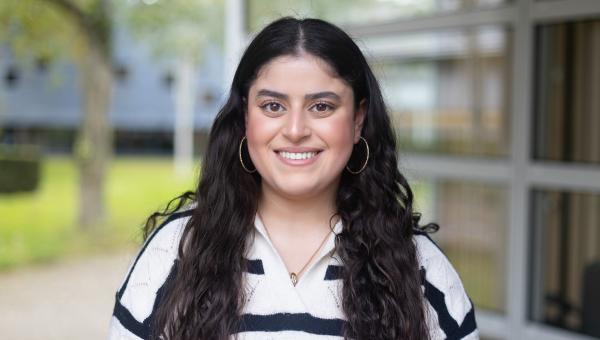Global Law careers and subsequent Master's programs
Most students choose to do a Master's program after completing their Bachelor’s degree in Global Law. After graduation, you are ready to face complex legal issues in a transnational environment. You will have the skills of a global lawyer, a well-rounded legal advisor who is able to tie different legal systems and jurisdictions together. In general, two prominent career paths can be distinguished; a traditional legal profession or you can become a lawyer in an (international) organization or company.
Directly to:
Possible jobs Global Law
After obtaining a Bachelor's degree, most students choose to pursue a Master's of Laws in the Netherlands or abroad. Graduates find employment in legal departments of large corporations, begin traineeships in global law firms or in consultancies, or they start their own businesses. Numerous graduates of the Global Law Bachelor have proceeded to work in NGOs or transnational organizations, such as the European Union, NATO or the UN. Many of our graduates also participate in internships after graduation in corporations, the civil society sector and international organizations as they try out different career paths. Because of the interdisciplinary character and the focus on skills in this program, you are well prepared to become a key figure, a linking pin, between legal departments and financial, technical or innovation experts in firms and organizations.
What can you do with a Global Law LLB degree?
- As a legal counsel at an international firm, you will deal with all legal aspects of business operations. You advise in the areas of contracts, laws and regulation issues. As well as checking contracts, you could also be responsible for writing them.
- As a compliance analyst, you will check whether organizations comply with government and industry regulations. You will research policy and prescriptions, communicate requirements and request certification for organizations.
Graduates found work at Brandl & Talos Rechtsanwälte (international law firm in Vienna), Accenture, Reynen Court LLC, Simmons & Simmens and KPMG.
Two paths to a legal career
The Bachelor’s program in Global Law has been designed to offer a range of different career options in the legal field. In general, two prominent career paths can be distinguished:
- The first path leads towards the traditional legal professions
- The second path leads towards becoming a lawyer in an organization or company.
Below, you will find what these paths entail.
1. The traditional legal professions
Each country has specific requirements for people who wish to work in the traditional legal professions. The legal profession includes professionals practicing law in a law firm.
In order to gain access to the legal professions in most jurisdictions, the candidate must meet the rules for admission to the Bar or to an equivalent professional organization.
Tilburg Law School offers special opportunities for you in the Netherlands, England and Wales, France or the U.S.
The Netherlands: Civiel effect
With the minor Dutch Law (only in Dutch), some extra courses and a Master's degree in Law, the Bachelor's program in Global Law offers you the opportunity to apply for the Civiel Effect. This is mandatory to be allowed to join the Dutch Bar Association (Nederlandse Orde van Advocaten). With this, you can eventually become a lawyer (advocaat) or a judge.
England and Wales
England and Wales have two different legal professions - barristers and solicitors - and Scotland has a different professional system altogether.
Bachelor graduates in Global Law can proceed to study for what is called the Graduate Diploma in Law (GDL), also known as a conversion course, at a university in England. Some universities, such as City University, also offer a two-year LL.B. This one-year course in English Law is designed to bring graduates to the level where they can enter the legal profession. Afterwards, graduates must undertake what is called a professional training, which consists of a one-year professional course that prepares the graduate to become a solicitor (Legal Practice Course / LPC) or a barrister (Bar Professional Training Course / BPTC). This option therefore entails two years of study after graduation from Tilburg University.
If you are able to secure a training contract from a law firm, this firm may pay all or part of the costs of the GDL and/or LPC. If you intend to become a barrister, all or part of the costs of the BPTC may be paid for by a set of chambers in England or by a law firm from a country belonging to Commonwealth which recognizes the Bar as a route to their legal profession.
France
Global Law students/graduates are eligible to sit the US Bar prep course for international students offered at partner Université de Paris Dauphine to sit the California Bar. If you have done an exchange course at Université de Paris Dauphine, you are eligible for a discounted rate.
You can also sit the Solicitors Qualifying Exam (SQE) at Université de Paris Dauphine to qualify as a solicitor in England & Wales.
United States of America
In the United States, each state as well as the District of Columbia has their own bar exam. Each jurisdiction has specific regulations for becoming qualified to practice law.
There is a possibility to follow an educational track after the GLB to become qualified in the US. Some states allow foreign-qualified applicants who have completed a one-year LL.M. in the US to take the bar exam. It is important to confirm with the university offering the LL.M. degree that the GLB will be recognized by the state bar commission and which LL.M. coursework needs to be completed to qualify. Alternatively, students may choose to transfer to a JD program after the completion of their LL.M.
Tilburg Law School has an agreement with the University of Connecticut, University of Minnesota Law School and University of Illinois College of Law which may make you eligible for a generous merit scholarship for their LL.M.
2. Becoming a lawyer in an organization or company
With an LL.B. or LL.M. in your pocket, you are ready to start your career as a professional in an interdisciplinary team within a large organization. With the skills acquired during your studies, you will be well equipped to aim for leading positions in the international job market.
A significant number of lawyers, such as specialists in law - typically called ‘in-house counsel’ -, are employed by large organizations other than law firms. Such organizations are, for instance, large businesses, large non-profit or non-governmental organizations, ministries or other public administrations, or international organizations. Typically, these positions do not require the applicant to be a member of any professional Bar association, as long as he or she has been trained in law. Accordingly, the Bachelor’s program in Global Law, if followed by an appropriate Master's degree, will enable you to apply for these positions.
Did you complete Global Law as a graduate entrant? Then you have acquired a unique combination of knowledge and skills. This makes you a force to be reckoned with in the international job market.
Subsequent Master's programs Global Law
After getting your Bachelor's degree, you could start looking for a job, but you will significantly improve your chances by doing a Master's program. With Global Law, you have a wide range of Tilburg University Master's programs to choose from. Some Master's programs require you to take certain courses during your Bachelor's program in order to be admitted. Make sure to check the application and admission page of the Master's program of your choice. With your Bachelor's degree, you will have access to the following Master's programs at Tilburg University:
-

Law and Technology (LLM)
In addition to traditional legal doctrine, you will also learn about regulatory issues in the spheres of public, private, and criminal law, and such subjects as comparative law, jurisprudence, ethics, and the influence of the choice of a particular technology on the type of regulation and public administration.
More information -

International Law and Global Governance (LLM)
Learn to navigate a world in which rules and systems of governance are becoming increasingly informal and transnational.
More information -

European Law and Global Risk (LLM)
Focus on European law in relation to global challenges like climate change, trade, migration and the decline of rule of law. European law is a leading force when it comes to addressing societal issues in Europe as well as globally. European law is crucial for any lawyer, because it impacts all aspects of domestic law, from business to social welfare.
More information -

International Business Law: Digital Innovation in Commerce and Finance (LLM)
Examine the role of lawyers in a rapidly evolving business environment, where new technologies and the call for more ethical business practices change the way in which we conduct business.
More information -

International Business Taxation (LLM)
Combine legal and economic knowledge to become a tax expert specialized in international business. Gain the academic skills to fully understand the impact of taxation in combination with new technologies on a global scale.
More information -

Labour Law and Employment Relations (Arbeidsrecht)(LLM)
Integrate labour law, social policy and human resource management to take an international, European perspective on the international labour market.
More information -

Public Governance (Bestuurskunde): Public Administration, Economics and Law (MSc)
Combine the disciplines of public administration, law and economics in our Master's program in Public Governance to act on multi-level and multi-actor governance issues that require creative solutions. Become an elite strategical force, in the Netherlands or abroad.
More information -

Rechtsgeleerdheid (LLM) (in Dutch)
With the master’s program Rechtsgeleerdheid (Dutch Law) in Tilburg, you choose a broad master's where you will deepen your knowledge in all main legal areas. In addition to the broad legal foundation, you choose a profile with which you specialize in your area of interest. Tilburg also offers several extended master's programs.
More information -

Ondernemingsrecht (LLM) (in Dutch)
Prepare for a career as a corporate lawyer or company lawyer, operating on the cutting edge of law, economics, and organizational sciences. You provide organizations with substantiated legal advice in the development of their company policy and strategy, for example in the areas of financing, risk management, and reorganizations.
More information

Career orientation
During your studies, through the choices you make. But also through practical experience, networking and developing your professional skills. Our Fit For The Future Career Program prepares you for the labor market.
Read more